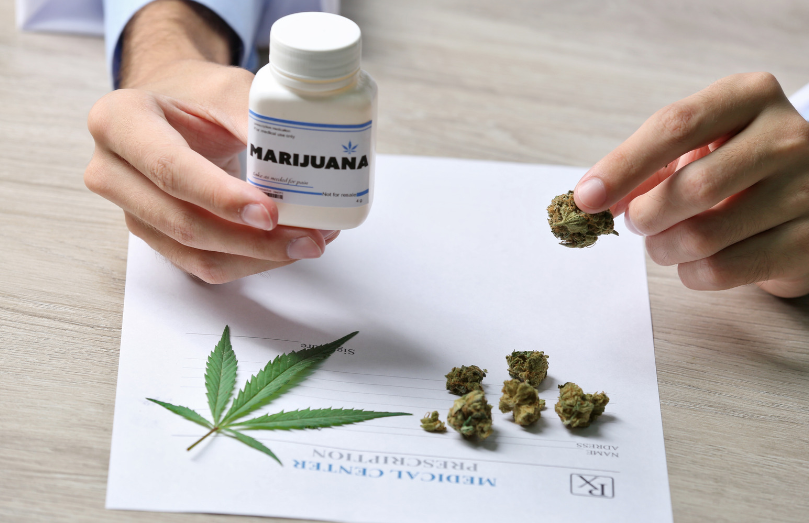Medical Marijuana for Ulcerative Colitis [IBD]
- ARCannabisClinic
- Sep 6, 2023
- 14 min read
The intersection of medical marijuana and inflammatory bowel disease, including ulcerative colitis, has gained notable attention in recent years. This exploration seeks to illuminate the potential benefits, clinical studies, and mechanisms by which medical cannabis might influence the symptoms of ulcerative colitis and other IBD conditions. With increasing numbers of IBD patients turning to cannabis products for potential relief from symptoms like abdominal pain, it's crucial to understand the science and the studies behind it.

Table of Contents:
Clinical Efficacy of Cannabis in Treating Ulcerative Colitis
Safety Concerns and Side Effects of Medical Marijuana Use in IBD Patients
Mechanisms of Action: How Cannabis Influences Intestinal Inflammation
Comparative Analysis: Medical Marijuana vs. Traditional IBD Medications
Regulatory and Prescription Protocols for Cannabis in IBD Management
Clinical Efficacy of Cannabis in Treating Ulcerative Colitis
Ulcerative colitis is a subtype of inflammatory bowel disease (IBD) that predominantly affects the large intestine. As patients suffer from abdominal pain, rectal bleeding, weight loss, and many other symptoms, improving the quality of life becomes a pivotal aim of any effective treatment. Among the numerous treatment options being studied, medical marijuana or cannabis has drawn significant attention in recent years.
Clinical studies have begun to illuminate the potential benefits of cannabis for ulcerative colitis. The human body's endocannabinoid system, which interacts with compounds from the cannabis plant, plays crucial roles in inflammation regulation, especially in the gastrointestinal tract. This has led researchers to investigate the impact of medical cannabis on the symptoms of ulcerative colitis and the overall quality of life of patients.
Several clinical trials have indeed explored the efficacy of cannabis in treating ulcerative colitis. In these studies, some IBD patients showed positive responses to cannabis treatments, experiencing relief from chronic pain, reduced inflammation in the digestive tract, and improvement in other clinical symptoms. It's worthy to note, however, that while some patients found substantial relief, others observed minor to negligible changes. Moreover, the psychoactive effects of certain cannabis compounds need to be weighed against the therapeutic benefits.

While smoking is a known method of cannabis consumption, ulcerative colitis patients have several other options, such as cannabis oil and edibles. This variety allows for the tailoring of treatment based on individual needs, preferences, and the specific clinical symptoms exhibited. As for side effects, like any treatment, cannabis use carries potential risks. It's paramount that individuals engage with their health care provider to gain a comprehensive understanding of both the potential benefits and side effects of cannabis use.
It's imperative to highlight the importance of sourcing cannabis from reputable sources for medicinal purposes. Given its increasing acceptance for medical use, ensuring the product's quality and safety is of utmost importance. One way for patients to ensure they're on the right track with their treatment is through organizations like ARCannabisClinic, which offer a structured path to access medical marijuana. Their medical marijuana therapy, for instance, provides one-on-one consultations with cannabis experts, guiding patients on strains, ratios, and dosing instructions.
For those curious about the legal landscape, the legal status of medical marijuana for IBD varies across the United States. Therefore, it's crucial for patients to acquaint themselves with local regulations, perhaps starting with a state-by-state guide like this one.
In summary, while medical marijuana holds potential promise for many ulcerative colitis patients, its clinical efficacy varies. Ongoing research, coupled with patient testimonials and clinical experiences, will further shape our understanding of cannabis as a treatment for IBD.
Tweet this: "Exploring the clinical efficacy of cannabis in treating ulcerative colitis, diving deep into the research and patient experiences. #MedicalCannabis #UlcerativeColitis #InflammatoryBowelDisease #TreatmentOptions 🌿"
Key Takeaway: Medical marijuana offers potential therapeutic benefits for ulcerative colitis, but its clinical efficacy varies among patients. Ongoing research and expert consultations, like those provided by ARCannabisClinic, are essential for patients considering cannabis as a treatment option.
Safety Concerns and Side Effects of Medical Marijuana Use in IBD Patients
While the therapeutic potential of medical cannabis for various conditions, including inflammatory bowel disease (IBD), has been researched extensively in recent years, it's paramount to also scrutinize the safety concerns and potential side effects that might arise. For IBD patients who experience chronic pain, abdominal pain, and other debilitating symptoms, the relief brought by medical cannabis is a beacon of hope. Nevertheless, like all treatments, the use of cannabis is not devoid of risks.

For the uninformed, IBD encompasses conditions that cause inflammation of the digestive tract, including ulcerative colitis and Crohn's disease. These conditions can be excruciating, impacting the quality of life and requiring effective treatment options. The endocannabinoid system, present throughout the human body, plays a vital role in modulating many physiological processes. Cannabis, with its active ingredients targeting this system, shows promise. But, how does it affect the IBD patient's body beyond the intended therapeutic effects?
Potential Side Effects
The psychoactive effects of cannabis, particularly from THC, the main psychoactive component of the cannabis plant, is a significant concern. While these effects can be therapeutic for some conditions, for IBD patients, they might cause discomfort, especially if the medical marijuana product is not appropriately balanced with CBD, which counteracts some of THC's psychotropic effects.
Moreover, long-term use can lead to tolerance, meaning the patient might require more of the substance to achieve the same relief. This increase can exacerbate potential adverse effects.
Another potential issue is the effect on the immune system. Some studies suggest that marijuana might suppress the immune system. While this can be beneficial for autoimmune diseases like IBD, where the immune cells attack the digestive tract, the broader implications for overall health need consideration.
Furthermore, like smoking tobacco, smoking cannabis can lead to respiratory issues. For IBD patients already grappling with a chronic condition, adding respiratory problems into the mix can be problematic. It's why many health care providers recommend vaporization or other methods of ingestion over smoking.
Lastly, as with any medication, there's the potential for drug interactions. Medical cannabis might interact with other medications an IBD patient is taking. It's vital for patients to consult with their health care provider before starting any cannabis treatment.
Safety Concerns
Beyond side effects, there are safety concerns regarding the quality and sourcing of medical cannabis. The cannabis industry, though burgeoning in the United States, is still finding its footing regarding regulation. This uncertainty means there's variability in product quality. Patients might unknowingly consume cannabis products tainted with pesticides, heavy metals, or other contaminants.
Moreover, the legal status of cannabis, which varies across states in North America, complicates matters. Patients might find themselves in legal gray areas, even if they're using cannabis for medicinal purposes.
Navigating Treatment Options
IBD patients considering medical cannabis should always work closely with a reputable health care provider, familiar with both IBD and medical cannabis. A personalized approach, considering the patient's specific symptoms, current treatments, and potential benefits and risks of cannabis, is essential.
For those wondering about the qualifying conditions for a medical marijuana card, the ARCannabisClinic's guide provides comprehensive insights.
Key Takeaway
Medical cannabis offers potential relief for IBD patients, but like all treatments, it's not without risks. Understanding the potential side effects and safety concerns, and working closely with a knowledgeable health care provider, will ensure the best therapeutic outcome while minimizing risks.
Tweet this: "While medical cannabis promises relief for IBD patients, it's crucial to understand its safety concerns and potential side effects. Knowledge is power. #MedicalCannabis #IBD #SafetyFirst #InformedChoice" Tweet Now
For further reading on the impact of cannabis on various conditions, this external research article offers a deep dive into the effects of cannabis on the human body.
Mechanisms of Action: How Cannabis Influences Intestinal Inflammation
The human body is an intricate network of systems, and the gut is perhaps one of the most fascinating among them. Intestinal inflammation, especially in conditions such as Crohn's disease or ulcerative colitis, can be a formidable adversary. Increasingly, medical practitioners and patients alike have turned their attention to cannabis, seeking its potential anti-inflammatory effects. To truly understand its influence, we must first delve deep into the mechanisms by which cannabis interacts with our body.

Endocannabinoid System and Inflammation
At the center of the cannabis-intestinal interaction lies the endocannabinoid system (ECS). The ECS is a complex cell-signaling system in our bodies that plays a pivotal role in regulating a myriad of physiological processes, including mood, appetite, and importantly for this discussion, immune response.
Cannabinoids, whether endogenously produced by the body or introduced via cannabis consumption, interact with receptors within this system. The two primary receptors identified are CB1 and CB2. CB1 receptors are predominantly found in the brain, while CB2 receptors are primarily in the immune cells. When cannabinoids bind to these receptors, especially CB2, they have the potential to modulate inflammatory responses.
Cannabis Compounds and Their Effects
THC (tetrahydrocannabinol) and CBD (cannabidiol) are the two main cannabinoids in cannabis. While THC is best known for its psychoactive properties, it also has anti-inflammatory effects. By interacting with the ECS, THC can reduce the production of inflammatory cytokines and chemokines, thereby potentially alleviating inflammation.
CBD, on the other hand, is non-psychoactive. Its role in reducing inflammation might not be as direct as THC's. Instead, it seems to influence other receptors, like the vanilloid receptor, to decrease the perception of pain. It also seems to have an immunosuppressive effect, which can be beneficial in conditions where the immune system is overactive, as seen in many IBD cases.
Implications for IBD and Intestinal Health
Given the above mechanisms, cannabis appears to offer hope for those with inflammatory conditions of the gut. By modulating the immune response and decreasing the perception of pain, cannabinoids might alleviate some of the debilitating symptoms associated with conditions like Crohn's disease or ulcerative colitis.
However, it's essential to approach this treatment avenue with a well-informed perspective. There's a need for more comprehensive, large-scale clinical trials to substantiate these findings fully and to determine the optimal doses and forms of cannabis for different patients. The how marijuana helps with Crohn's disease page offers more insights on this topic for those keen to explore further.
Key Takeaway
While the endocannabinoid system offers a window into understanding the potential benefits of cannabis in managing intestinal inflammation, it's vital to approach its use judiciously, under the guidance of experienced healthcare professionals.
Tweet this: "Delving into the mechanisms of how cannabis interacts with our gut gives hope for those grappling with intestinal inflammation. Knowledge paves the way for better health outcomes. #CannabisResearch #IntestinalHealth #EndocannabinoidSystem" Tweet Now
To further deepen your understanding of cannabis's role in health, this comprehensive research article is a valuable resource.
Comparative Analysis: Medical Marijuana vs. Traditional IBD Medications
Inflammatory Bowel Disease (IBD) remains a significant cause of discomfort and concern for many. Traditional medications, while effective for some, often come with potential side effects. The recent surge in medical marijuana use, backed by growing anecdotal evidence, has prompted many to weigh its benefits against conventional IBD medications. This comparative analysis seeks to shed light on this subject, illuminating the strengths and weaknesses of both treatment methods.

Traditional IBD Medications: Pros & Cons
Traditional IBD medications primarily include aminosalicylates, corticosteroids, immunomodulators, and biologics.
Pros:
Established Track Record: These medications have been prescribed for decades and are backed by extensive clinical research.
FDA Approval: Their efficacy and safety profiles have undergone rigorous scrutiny.
Dosage Precision: Being synthetically produced, their doses can be precisely measured, ensuring consistent treatment.
Cons:
Side Effects: These can range from nausea, headaches, and weight gain to more severe reactions such as infections and liver damage.
Cost: Some biologics and newer drugs can be prohibitively expensive, especially if not covered by insurance.
Resistance: Over time, patients may develop resistance, rendering the drugs less effective.
Medical Marijuana: Pros & Cons
Medical marijuana, primarily consisting of compounds like THC and CBD, has garnered significant interest in its potential for IBD symptom relief.
Pros:
Natural Origin: As a plant-based product, many find solace in its organic nature.
Diverse Consumption Methods: Patients can choose between smoking, vaping, edibles, tinctures, and topicals, offering flexibility in administration.
Potential for Symptom Relief: Some patients report reductions in pain, inflammation, and even improvements in appetite and mood.
Cons:
Limited Research: Despite mounting anecdotal evidence, large-scale, double-blind clinical trials on medical marijuana's efficacy for IBD are still in infancy.
Variable Potency: The concentration of active compounds can differ based on cultivation and processing methods.
Legal Hurdles: Its legal status varies by jurisdiction, sometimes complicating its procurement.
Blending the Best of Both Worlds
For those considering a shift from traditional medications or integrating medical marijuana into their regimen, consultation with a healthcare professional is paramount. It might be beneficial to explore the marijuana therapy options available. Understanding potential drug interactions, side effects, and the correct dosages will ensure optimal results.
Key Takeaway
While traditional IBD medications have a longer track record and extensive research, medical marijuana offers a natural alternative that many find effective. Personalized treatment, guided by thorough research and professional advice, holds the key to managing IBD symptoms effectively.
Tweet this: "Weighing the pros and cons of traditional IBD medications against medical marijuana provides invaluable insights. Personalized treatment remains paramount. #IBDManagement #MedicalMarijuana #HealthChoices" Tweet Now
For a deeper dive into IBD and its potential treatments, this research study provides an excellent starting point.
Regulatory and Prescription Protocols for Cannabis in IBD Management
With the increased focus on alternative and more holistic treatments for various conditions, the use of cannabis, particularly for Inflammatory Bowel Disease (IBD), has witnessed a surge. However, the regulatory landscape governing its use remains intricate, especially given its varied status in different jurisdictions. This article delves deep into the regulatory and prescription protocols concerning cannabis use in IBD management.

The Regulatory Environment
The legal status of medical marijuana varies across countries and even states within countries.
Federal vs. State Laws: In the U.S., while many states have legalized medical marijuana, it remains illegal at the federal level. This dichotomy often results in complexities for physicians, patients, and distributors alike.
Controlled Substance: In many jurisdictions, marijuana is classified as a controlled substance. Its prescription, sale, and use are regulated, often necessitating licenses or special permissions.
Research Restrictions: Due to its controlled status, conducting large-scale, controlled clinical studies on the benefits of marijuana for IBD can be challenging, which impacts evidence-based endorsements.
Prescription Protocols
Given the intricate legal backdrop, the prescription of cannabis for IBD also involves strict protocols.
Qualifying Conditions: Only certain medical conditions qualify for medical marijuana treatment. For instance, some states recognize IBD as a qualifying condition, while others may not.
Doctor's Role: A physician needs to certify that a patient suffers from a qualifying condition and that they might benefit from marijuana treatment. Not every doctor can recommend cannabis; they usually need a special license or registration.
Patient Cards: Patients often need a medical marijuana card to purchase cannabis legally for medicinal purposes. Understanding how to get a marijuana card is essential for patients seeking relief through cannabis.
Dosage and Administration: Dosage is crucial. Unlike traditional medicines, the ideal dose of cannabis can vary widely among individuals. Close monitoring by a healthcare provider is often required to identify the right dosage.
Future Outlook
As research progresses and the potential benefits of cannabis in IBD management become clearer, one can expect an evolution in the regulatory and prescription landscape. Organizations like the Crohn's & Colitis Foundation are advocating for more robust research to firmly establish the role of cannabis in IBD treatment.
Key Takeaway
Navigating the maze of regulations and prescription protocols for cannabis in IBD management requires thorough understanding and guidance. While it promises potential relief for many, it's imperative for patients and physicians alike to stay informed and compliant.
Tweet this: "Understanding the regulatory and prescription landscape for cannabis in IBD management is crucial for patients seeking alternative relief. Staying informed ensures compliance and optimal treatment. #IBD #CannabisRegulations #MedicalMarijuana" Tweet Now
FAQ
What is Ulcerative Colitis and how does it relate to Inflammatory Bowel Disease (IBD)? Ulcerative colitis is a chronic inflammatory condition of the large intestine, a subtype of inflammatory bowel disease. It primarily affects the digestive tract, leading to symptoms like abdominal pain and rectal bleeding.
How might medical cannabis alleviate the symptoms of ulcerative colitis? Medical marijuana, particularly its active ingredients like CBD oil, has anti-inflammatory effects that might soothe intestinal inflammation, potentially providing relief from ulcerative colitis symptoms.
Are there clinical trials supporting the use of cannabis for Ulcerative Colitis? Yes, some clinical studies and clinical trials have explored the effects of cannabis on ulcerative colitis. While results vary, there's growing interest in its potential benefits for IBD patients.
What's the difference between medical marijuana and recreational cannabis? Medical marijuana is prescribed by a health care provider for specific medical conditions, like ulcerative colitis symptoms, based on its potential therapeutic effects. Recreational cannabis, on the other hand, is used for recreational purposes without a specific medical justification.
How does the endocannabinoid system in the human body relate to the use of cannabis for IBD? The endocannabinoid system in the human body interacts with compounds found in the cannabis plant. This system plays roles in regulating various physiological processes, including inflammation in the gastrointestinal tract, which is why medical cannabis might benefit IBD patients.
Are there safety concerns regarding the use of cannabis for Ulcerative Colitis? Yes, like any treatment, there are potential risks and adverse events associated with the use of cannabis. It's essential to consult with a health care provider to understand both the potential benefits and side effects.
How does medical marijuana compare with current treatments for IBD? While medical marijuana shows promise for some IBD patients in alleviating symptoms like chronic pain, it's crucial to compare its efficacy and safety profile with traditional treatment options in clinical settings.
Is it legal to use medical marijuana for ulcerative colitis in the United States? The legal status of medical marijuana varies by state in the United States. It's vital to check with local regulations and consult with a reputable organization like ARCannabisClinic.
What are the potential side effects of using cannabis for IBD? Some potential side effects include psychoactive effects, alterations in blood pressure, and digestive tract disturbances. However, side effects can vary depending on the strain and dosage of cannabis used.
How can one ensure they're getting the right strain and dosage for their condition? By consulting with a reputable clinic, like ARCannabisClinic, patients can receive personalized guidance on strains, ratios, and dosing instructions specific to their medical conditions.
Can medical cannabis help with weight loss or weight gain issues associated with IBD? Some patients report an increase in appetite and subsequent weight gain with marijuana use. However, individual responses can vary, and it's crucial to monitor weight changes under medical supervision.
Is smoking cannabis the only way to consume it for IBD symptoms? No, there are various forms, including cannabis oil, edibles, and capsules. The choice depends on patient preference, clinical symptoms, and the recommendation of the health care provider.
Does CBD oil have the same effects as whole cannabis in treating IBD? CBD oil is just one component of the cannabis plant and has specific anti-inflammatory effects. However, whole cannabis contains other compounds that might also influence the symptoms of ulcerative colitis.
Do all IBD patients experience positive effects from cannabis use? No, the effects of cannabis can vary among individuals. While some IBD patients find relief, others might not notice significant changes or could experience adverse effects.
Are there any concerns about long-term use of medical marijuana for IBD? Long-term risks and benefits of medical marijuana for IBD are still under research. It's essential to have regular check-ups with a health care provider when using cannabis for a chronic condition.
Can the use of marijuana worsen the clinical symptoms of ulcerative colitis? In some cases, especially if not properly dosed or if the wrong strain is used, cannabis might not help or could potentially exacerbate clinical symptoms. Regular consultation with a medical expert is advised.
How does the endoscopic score of an IBD patient influence the recommendation for medical cannabis? The endoscopic score, which assesses the severity of intestinal inflammation, can guide health care providers in recommending treatments, including the potential use of medical marijuana.
Is there a placebo effect associated with cannabis use for IBD? Like any treatment, there's potential for a placebo effect. Some clinical trials use a placebo group to compare the genuine effects of cannabis against the placebo response in IBD patients.
Do all states in the United States allow the prescription of medical marijuana for IBD? Not all states have approved medical marijuana for IBD. Patients should consult local regulations or organizations like ARCannabisClinic for guidance.
What role does the colitis foundation play in the research of cannabis for IBD? The colitis foundation, along with other health organizations, often funds research, provides resources, and raises awareness about potential treatments, including the use of cannabis for IBD.
Conclusion:
As the world sees a growing acceptance and use of cannabis, both for recreational and medicinal purposes, understanding its potential benefits and risks becomes paramount. Especially for chronic conditions like IBD, the potential for medical cannabis to offer symptom relief is tantalizing but must be approached with caution and knowledge. This is where reputable entities like ARCannabisClinic come into play. The ARCannabisClinic stands out as a national network of marijuana doctors that facilitates legal access to medical marijuana in various states across the United States. Patients can benefit from their industry-leading MMJ Therapy Visit, a tailor-made consultation with a cannabis expert, outlining a clear medical marijuana treatment plan encompassing strains, ratios, and dosing instructions. ARCannabisClinic is also known for its comprehensive diagnostic evaluations, spanning areas from PTSD and anxiety to general medical evaluations. This approach negates the need for patients to procure outside medical records, and greatly speeds up the process of getting a patient approved for a medical marijuana card in their state. As with any health condition or treatment, it's imperative to collaborate with a trustworthy health care provider. By opting for services from a reliable institution like ARCannabisClinic, individuals ensure they are receiving guidance grounded in expertise and genuine care.


